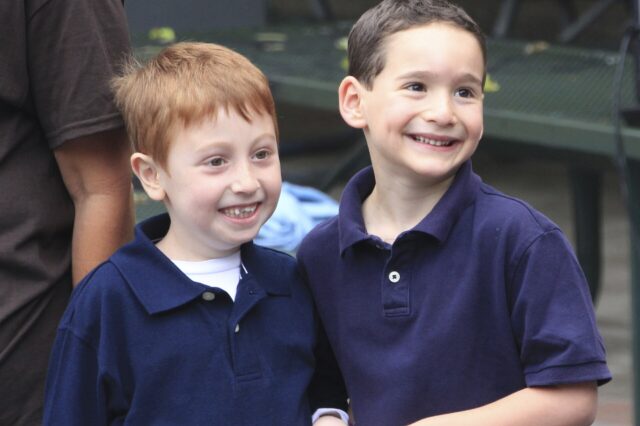“Chocolate Bar Book” reaches goal of $1 million for glycogen storage disease research

An 8-year-old boy’s dream to raise $1 million to help find a cure for his best friend’s liver disease became a reality this week when sales from his book “Chocolate Bar” reached the significant milestone.
As a first-grader in 2012, Dylan Siegel of California wrote and illustrated the 14-page picture book to raise money to fight glycogen storage disease, a rare genetic disorder that affects his friend Jonah Pournazarian. Proceeds from “Chocolate Bar” are donated to the University of Florida glycogen storage disease program, the largest clinical and research program for Jonah’s condition in the world.
On Dec. 15, Dylan notified David Weinstein, M.D., M.M.Sc., Jonah’s doctor and director of UF’s GSD program, that sales from his book and donations from around the globe have combined to bring in $1 million to help find better treatments and ultimately a cure for GSD, which disrupts how the body uses sugar for energy.
“I am so happy that we finally reached my $1 million goal, and that kids around the world have been inspired by my story,” Dylan said. “I will continue to raise money until Jonah’s disease is cured forever.”
About one in 100,000 people have GSD, but Jonah’s type, Type Ib, is a one-in-a-million case. Because patients with GSD cannot properly store and convert food to energy, they cannot maintain blood sugar levels between meals. Those who suffer from Type Ib GSD also have low white blood cell counts that can cause serious and often fatal health risks, and they suffer from inflammatory bowel disease. Jonah’s rare disorder means a constant battle against dangerously low blood sugar levels and infection. As treatment, he receives doses of cornstarch at scheduled intervals throughout the day and night because it metabolizes more slowly than other carbohydrates.
At UF Health, researchers with the GSD program are examining gene therapy as a treatment option that could ultimately cure people with the disease.
“I am so proud of Dylan. His book has done more to bring attention to this rare genetic disease than anything else that has been done before,” said Weinstein, a professor of pediatric endocrinology at UF Health. “His fundraising has helped maintain our research program, and the “Chocolate Bar” book has raised more money than all medical foundations combined for this disease. Because of Dylan, children all around the world are getting healthier.”
Dylan’s idea for the book stems from his use of the words “chocolate bar” to describe what is awesome to him. He set his sights on using the chocolate bar theme to help fund a cure for his friend’s disease. What began as a school fundraiser soon escalated into an international effort, with more than 25,000 books sold in all 50 states and 60 countries in two years.
“We are so proud, not only of Dylan and his efforts, but of the tens of thousands of people who have stepped up to help us reach this important milestone,” said Debra Siegel, Dylan’s mother. “Dylan has started a movement that we will continue to build. We are hearing from schools all around the world that are using Dylan's story to inspire their kids and show them what they are capable of.”
About the author
